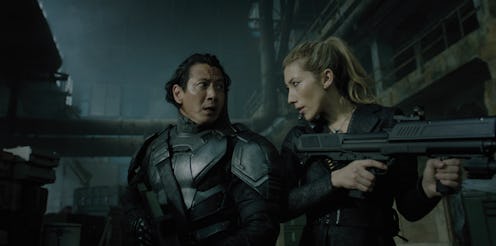Entertainment
'Altered Carbon's Showrunner Heard Your Whitewashing Concerns & Here's What She Has To Say

Hollywood has a long and problematic history of whitewashing, which is the practice in which white actors are cast in roles intended for non-white actors. The list of people who have contributed to this issue is extensive, ranging from A-list stars to directors and producers. Netflix's sci-fi dystopia Altered Carbon is just the latest project to face criticisms of whitewashing, and while the show's plot is a bit more complicated than a textbook example of the infamous practice, showrunner Laeta Kalogridis acknowledges that it's a concern.
The journey of adapting Richard K. Morgan's cyberpunk noir novel of the same name took Kalogridis almost 15 years, and as such, she's had time to think about her intentions in bringing the source material to the screen. The sprawling, complicated story is set more than 300 years in the future in a dystopian society that has been transformed by new technology: consciousness can be digitized and stored in "stacks," which function like memory cards embedded in the spine; human bodies are interchangeable to the point where they're called sleeves; and death is no longer permanent as stacks can be resleeved time and time again.
But here's where things get dicey. The main character, Takeshi Kovacs, a man of Japanese and Slavic descent, is the lone surviving soldier in a group of elite interstellar warriors who were defeated in an uprising against the new world order. His mind was imprisoned – on ice – for centuries until Laurens Bancroft (James Purefoy), an impossibly wealthy, long-lived man, offers Kovacs the chance to live again. In exchange, Kovacs has to solve Bancroft's own murder.
For the majority of the first season, Kovacs' stack is sleeved into the body of a white man, played by Joel Kinnaman. But Kovacs' original body was Asian (played in flashbacks by Will Yun Lee), and his real sense of self is tied to his heritage, not whatever sleeve he was forced into by Bancroft. So, yes, an Asian character is being played by a white man, but the reasons for this being the case are a bit more complicated. Kalogridis emphasizes she's well aware of the whitewashing issues in Hollywood, but despite the potential problems it may have caused, she was committed to staying loyal to Altered Carbon's source material.
"I personally feel that the whitewashing problem is huge," she says. "I did not want to be in any way contributing to it. I did work on Ghost in the Shell at one point [another recent property widely criticized for having Scarlett Johansson play an Asian character], before it changed directors and way before any cast decisions were made. Ghost in the Shell for me was a frustrating example of taking an iconic character, Major Motoko Kusanagi who is in Tokyo and is Japanese — I've never seen her as anything other than Japanese — and [making her white]."
So when it came time for Kalogridis to adapt Altered Carbon for Netflix, she knew she had to figure out a way to avoid criticisms of whitewashing when the story itself could potentially be perceived that way (it should be noted, however, that the book is told from Kovacs' point of view and his inner thoughts show the struggle he feels being trapped in a white man's body despite his heritage and identity).
Kalogridis decided that the best way to respond to the whitewashing problem was to build out a story that wasn't in the book at all of Kovacs' past life. "I decided to show [Kovacs] in three different Asian actors and make those stories a huge part of who he was," Kalogridis says, noting that the opening of the show is a 20-minute scene featuring Byron Mann, who plays a previous Asian sleeve of Kovacs'. She also points out that she wanted the flashbacks to be significant — "not like two seconds" — which led to more development of Kovacs' character as an Asian child.
"I attempted to mitigate what I regarded as definitely a problem, even though it is part of the DNA of the book," she says. "I was not changing what was in the book but I still see it as an issue myself, so I tried to build out a story where I was able to create two Asian men as leads in a cinematic television show, so even though we're also looking at Joel [Kinnaman] as a lead of the show, we are experiencing that same character through the eyes of two Asian men and they as creators of the character are equally as important and have enough screen time that they are definitely playing leading men."
Kalogridis is proud that she was able to add more representative and inclusive roles to the series because of that. "Although that's not technically the same as the whitewashing issue, I think the difficulty in representation is an issue as well," she says. "So I was trying to do what I could about that too." But still, Kalogridis is absolutely willing to hold herself accountable.
"I want to be really clear: the [whitewashing] problem is huge and I absolutely recognize it," she says. "I attempted to mitigate it and it won't be up to me to say whether or not I succeeded. I hope people will feel that I did. That's just how I attempted it." Now that Altered Carbon is streaming in full on Netflix, you can judge her efforts for yourself.